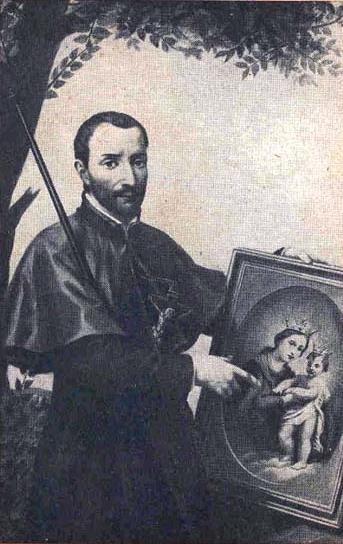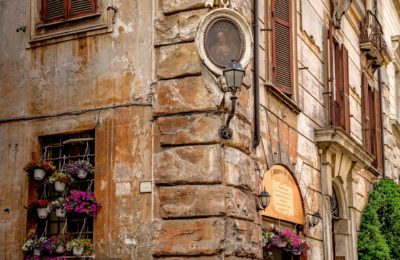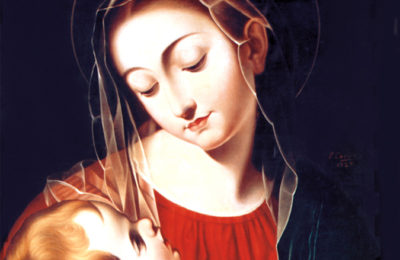On January the 16th, the Roman Catholic Church commemorates the Blessed Virgin Mary under the title of Refuge of Sinners. St. Alphonsus Liguori (b. 1696- d. 1787) wrote quite a bit about the manner in which Our Lady is a refuge for sinners in his book The Glories of Mary. I never tire of reading of this glory of Mary; the glory whereby she is a place of safety for those who call upon her. So, for today, I am re-posting the following from St. Alphonsus; do enjoy! ~SCF
Begin excerpt from The Glories of Mary (excerpt continues until end of post):
In the first chapter of the Book of Genesis we read that God made two great lights: a greater light to rule the day; and a lesser light to rule the night (Gen. 1, 16). Cardinal Hugo says that “Christ is the greater light to rule the just, and Mary the lesser to rule the sinners”; meaning that the sun is a figure of Jesus Christ, whose light is enjoyed by the just who live in the clear day of divine grace; and that the moon is a figure of Mary, by whose means those who are in the night of sin are enlightened. Since Mary is this auspicious luminary, and is so for the benefit of poor sinners, should any one have been so unfortunate as to fall into the night of sin, what is he to do? Innocent III replies, “Whoever is in the night of sin, let him cast his eyes on the moon, let him implore Mary” (In Assumpt. s. 2). Since he has lost the light of the sun of justice by losing the grace of God, let him turn to the moon, and beseech Mary; and she will certainly give him light to see the misery of his state, and strength to leave it without delay. St. Methodius says “that by the prayers of Mary almost innumerable sinners are converted” (Paciucch. in Ps. lxxxvi. exc, 17).
One of the titles which is the most encouraging to poor sinners, and under which the Church teaches us to invoke Mary in the Litany of Loretto, is that of “Refuge of Sinners.” In Judea in ancient times there were cities of refuge, in which criminals who fled there for protection were exempt from the punishments which they had deserved. Nowadays these cities are not so numerous; there is but one, and that is Mary, of whom the Psalmist says Glorious things are said of thee, O city of God (Ps. lxxxvi. 3). But this city differs from the ancient ones in this respect—that in the latter all kinds of criminals did not find refuge, nor was the protection extended to every class of crime; but under the mantle of Mary all sinners, without exception, find refuge for every sin that they may have committed, provided only that they go there to seek for this protection. “I am the city of refuge,” says St. John Damascene, in the name of our Queen, “to all who fly to me” (In Dorm. B. V.or. 2). And it is sufficient to have recourse to her, for whoever has the good fortune to enter this city need not speak to be saved. Assemble yourselves, and let us enter into the fenced city, and let us be silent there (Jer. viii. 14), to speak in the words of the prophet Jeremias. This city, says Blessed Albert the Great, is the most holy Virgin fenced in with grace and glory. “And let us be silent there,” that is, continues an interpreter, “because we dare not invoke the Lord, whom we have offended, she will invoke and ask” (Bib. Mar. Jer. n. 3). For if we do not presume to ask our Lord to forgive us, it will suffice to enter this city and be silent, for Mary will speak and ask all that we require. And for this reason, a devout author exhorts all sinners to take refuge under the mantle of Mary, exclaiming, “Fly, O Adam and Eve, and all you their children, who have outraged God; fly, and take refuge in the bosom of this good mother; know you not that she is our only city of refuge?” (B. Fernandes in Gen. c 3, s. 22) “the only hope of sinners” (Serm. 194, E. B. app.), as she is also called in a sermon by an ancient writer, found in the works of St. Augustine.
St. Ephrem, addressing this Blessed Virgin, says, “Thou art the only advocate of sinners, and of all who are unprotected.” And then he salutes her in the following words: “Hail, refuge and hospital of sinners!” (De Laud. Dei gen.)—true refuge, in which alone they can hope for reception and liberty. And an author remarks that this was the meaning of David when he said, For He hath hidden me in his tabernacle (Ps. xxvi. 5). And truly what can this tabernacle of God be, unless it is Mary! who is called by St. Germanus, “A tabernacle made by God, in which he alone entered to accomplish the great work of the redemption of man” (In Nat. S. M. or. 2).
St. Basil of Seleucia remarks, “that if God granted to some who were only his servants such power, that not only their touch but even their shadows healed the sick, who were placed for this purpose in the public streets, how much greater power must we suppose that he has granted to her who was not only his handmaid but his Mother?” We may indeed say that our Lord has given us Mary as a public infirmary, in which all who are sick, poor, and destitute can be received. But now I ask, in hospitals erected expressly for the poor, who have the greatest claim to admission? Certainly the most infirm, and those who are in the greatest need.
And for this reason should any one find himself devoid of merit and overwhelmed with spiritual infirmities, that is to say, sin, he can thus address Mary: O Lady, thou art the refuge of the sick poor: reject me not; for as I am the poorest and the most infirm of all, I have the greatest right to be welcomed by thee.
Let us then cry out with St. Thomas of Vallanova, “O Mary, we poor sinners know no other refuge than thee, for thou art our only hope, and on thee we rely for our salvation” (De Nat. V. M. conc. 3). Thou art our only advocate with Jesus Christ; to thee we all turn ourselves.
In the revelations of St. Bridget, Mary is called the “Star preceding the sun” (Rev. Extr. c. 50), giving us thereby to understand, that when devotion towards the divine Mother begins to manifest itself in a soul that is in a state of sin, it is a certain mark that before long God will enrich it with his grace. The glorious St. Bonaventure, in order to revive the confidence of sinners in the protection of Mary, places before them the picture of a tempestuous sea, into which sinners have already fallen from the ship of divine grace; they are already dashed about on every side by remorse of conscience and by fear of the judgments of God; they are without light or guide, and are on the point of losing the last breath of hope and falling into despair; then it is that our Lord, pointing out Mary to them, who is commonly called the “Star of the Sea,” raises his voice and says, “O poor lost sinners, despair not; raise up your eyes, and cast them on this beautiful star; breathe again with confidence, for it will save you from this tempest, and will guide you into the port of salvation” (Psal. B. V. ps. 18). St. Bernard says the same thing: “If thou wouldst not be lost in the tempest, cast thine eyes on the star, and invoke Mary” (De Laud. V. M. hom. 2).
The devout Blosius declares that “she is the only refuge of those who have offended God, the asylum of all who are oppressed by temptation, calamity, or persecution. This Mother is all mercy, benignity, and sweetness, not only to the just, but also to despairing sinners; so that no sooner does she perceive them coming to her, and seeking her health from their hearts, than she aids them, welcomes them, and obtains their pardon from her Son. She knows not how to despise any one, however unworthy he may be of mercy, and therefore denies her protection to none; she consoles all, and is no sooner called upon than she helps whoever it may be that invokes her. She by her sweetness often awakens and draws sinners to her devotion who are the most at enmity with God and the most deeply plunged in the lethargy of sin; and then, by the same means, she excites them effectually, and prepares them for grace, and thus renders them fit for the kingdom of heaven. God has created this his beloved daughter of so compassionate and sweet a disposition, that no one can fear to have recourse to her.” The pious author concludes in these words: “It is impossible for any one to perish who attentively, and with humility, cultivates devotion towards this divine Mother” (Par. An. fid. p. 1, c. 18).
In Ecclesiasticus Mary is called a plane-tree: As a plane-tree I was exalted. And she is so called that sinners may understand that as the plane-tree gives shelter to travelers from the heat of the sun, so does Mary invite them to take shelter under her protection from the wrath of God, justly enkindled against them. St. Bonaventure remarks that the prophet Isaias complained of the times in which he lived, saying, Behold thou art angry, and we have sinned . . . there is none . . . that riseth up and taketh hold of thee (Is. lxiv. 5). And then he makes the following commentary: “It is true, O Lord, that at the time there was none to raise up sinners and without thy wrath, for Mary was not yet born;” “before Mary,” to quote the saint’s own words, “there was no one who could thus dare to restrain the arm of God.” But now, if God is angry with a sinner, and Mary takes him under her protection, she withholds the avenging arm of her Son, and saves him. “And so,” continues the same saint, “no one can be found more fit for this office than Mary, who seizes the sword of divine justice with her own hands to prevent it from falling upon and punishing the sinner” (Spec. B. V. lect. 7, 14). Upon the same subject Richard of St. Laurence says that “God, before the birth of Mary, complained by the mouth of the prophet Ezechiel that there was no one to rise up and withhold him from chastising sinners, but that he could find no one, for this office was reserved for our Blessed Lady, who withholds his arm until he is pacified (De Laud. B. M. l. 2, p. 5).
Basil of Seleucia encourages sinners, saying, “O sinner, be not discouraged, but have recourse to Mary in all thy necessities; call her to thine assistance, for thou wilt always find her ready to help thee; for such is the divine will that she should help all in every kind of necessity” (Paciucch. in Salve R. exc. 7). This mother of mercy has so great a desire to save the most abandoned sinners, that she herself goes in search of them, in order to help them; and if they have recourse to her, she knows how to find the means to render them acceptable to God. The patriarch Isaac, desiring to eat of some wild animal, promised his blessing to his son Esau on his procuring this food for him; but Rebecca, who was anxious that her other son Jacob should receive the blessing, called him and said, Go thy way to the flock, bring me two kids of the best, that I may make of them meat for thy father, such as he gladly eateth (Gen. xxvii. 9). St. Antoninus says (P. 4, t. 15, c. 2, #2), that Rebecca was a figure of Mary, who commands the angels to bring her sinners (meant by kids), that she may adorn them in such a way (by obtaining for them sorrow and purpose of amendment) as to render them dear and acceptable to the Lord.” And here we may well apply to our Blessed Lady the words of the Abbot Franco: “O truly sagacious woman, who so well knew how to dress these kids, that not only they are equal to, but often superior in flavor to rel venison” (De Grat. D. l. 3).
The Blessed Virgin herself revealed to St. Bridget “that there is no sinner in the world, however much he may be at enmity with God, who does not return to him and recover his grace, if he has recourse to her and asks her assistance” (Rev. l. 6, c. 10). The same St. Bridget one day heard Jesus Christ address his mother, and say that “she would be ready to obtain the grace of God for Lucifer himself, if only he humbled himself so far as to seek her aid” (Rev. extr. c. 50). That proud spirit will never humble himself so far as to implore the protection of Mary; but if such a thing were possible, Mary would be sufficiently compassionate, and her prayers would have sufficient power to obtain both forgiveness and salvation for him from God. But that which cannot be verified with regard to the devil is verified in the case of sinners who have recourse to this compassionate mother. Noah’s ark was a true figure of Mary; for as in it all kinds of beasts were saved, so under the mantle of Mary all sinners, who by their vices and sensuality are already like beats, find refuge; but with this difference, as a pious author remarks, that “while the brutes that entered the ark remained brutes, the wolf remaining a wolf, and a tiger a tiger—under the mantle of Mary, on the other hand, the wolf becomes a lamb, and the tiger a dove” (Paciucch. In Sal. Ang. exc. 4). One day St. Gertrude saw Mary with her mantle open, and under it there were many wild beats of different kinds—leopards, lions, and bears; and she saw that not only our Blessed Lady did not drive them away, but that she welcomed and caressed them with her benign hand. The saint understood that these wild beasts were miserable sinners, who are welcomed by Mary with sweetness and love the moment they had recourse to her (Insin. l. 4, c. 50).
It was, then, not without reason that St. Bernard addressed the Blessed Virgin, saying, “Thou, O Lady, dost not reject any sinner who approaches thee, however loathsome and repugnant he may be. If he asks thy assistance, thou dost not disdain to extend thy compassionate hand to him, to extricate him from the gulf of despair” (Depr. Ad. B. V.). May our God be eternally blessed and thanked, O most amiable Mary, for having created thee so sweet and benign, even towards the most miserable sinners! Truly unfortunate is he who loves thee not, and who, having it in his power to obtain thy assistance, has no confidence in thee. He who has not recourse to Mary is lost; but who was ever lost that had recourse to the most Blessed Virgin?
It is related in the sacred Scriptures that Booz allowed Ruth to gather the ears of corn, after the reapers (Ruth, ii. 3). St. Bonaventure says, “that as Ruth found favor with Booz, so has Mary found favor with our Lord, and is also allowed to gather the ears of corn after the reapers. The reapers followed by Mary are all evangelical laborers, missionaries, preachers, and confessors, who are constantly reaping souls for God. But there are some hardened and rebellious souls which are abandoned even by these. To Mary alone it is granted to save them by her powerful intercession” (Spec. B. V. M. lect. 5). Truly unfortunate are they if they do not allow themselves to be gathered, even by this sweet Lady. They will indeed be most certainly lost and accursed. But, on the other hand, blessed is he who has recourse to this good Mother. “There is not in the world,” says the devout Blosius, “any sinner, however revolting and wicked, who is despised or rejected by Mary; she can, she wills, and she knows how to reconcile him to her most beloved Son, if only he will seek her assistance” (Sac. An. fid. p. 3, c. 5).
With reason then, O my most sweet Queen, did St. John Damascene salute and call thee the “hope of those who are in despair”. With reason did St. Laurence Justinian call thee “the hope of malefactors”, and another ancient writer “the only hope of sinners”. St. Epherem calls her “the safe harbor of all sailing on the sea of the world”. This last-named saint also calls her “the consolation of those who are to be condemned”. With reason, finally, does St. Bernard exhort even the desperate not to despair; and, full of joy and tenderness towards his most dear Mother, he lovingly exclaims: “And who, O Lady, can be without confidence in thee, since thou assistest even those who are in despair? And I doubt not, that whenever we have recourse to thee, we shall obtain all that we desire. Let him, then, who is without hope, hope in thee” (Med. in Salv. R.).
EXAMPLE
St. Antonine relates (P. 4, t. 15, c. 5, #1) that there was a sinner who was at enmity with God, and who had a vision in which he found himself before the dread tribunal; the devil accused him, and Mary defended him. The enemy produced the catalogue of his sins; it was thrown into the scales of divine justice, and weighed far more than all his good works. But then his great advocate, extending her sweet hand, placed it on the balance, and so caused it to turn in favor of her client; giving him thereby to understand that she would obtain his pardon if he changed his life; and this he did after the vision, and was entirely converted.PRAYER
O most pure Virgin Mary. I venerate thy most holy heart, which was the delight and resting-place of God, thy heart overflowing with humility, purity, and divine love. I, an unhappy sinner, approach thee with a heart all loathsome and wounded. O compassionate Mother, disdain me not on this account; let such a sight rather move thee to greater tenderness, and excite thee to help me. Do not stay to seek virtues or merit in me before assisting me. I am lost, and the only thing I merit is hell. See only my confidence in thee and the purpose I have to amend. Consider all that Jesus has done and suffered for me, and then abandon me if thou canst. I offer thee all the pains of his life; the cold that he endured in the stable; his journey into Egypt; the blood which he shed; the poverty, sweats, sorrows, and death that he endured for me; and this in thy presence. For the love of Jesus, take charge of my salvation. Ah, my Mother, I will not and cannot fear that thou wilt reject me, now that I have recourse to thee and ask thy help. Did I fear this, I should be offering an outrage to thy mercy, which goes in quest of the wretched, in order to help them. O Lady, deny not thy compassion to one to whom Jesus has not denied his blood. But the merits of this blood will not be applied to me unless thou recommendest me to God. Through thee do I hope for salvation. I ask not for riches, honors, or earthly goods. I seek only the grace of God, love towards thy Son, the accomplishment of his will, and his heavenly kingdom, that I may love him eternally. Is it possible that thou wilt not hear me? No; for already thou has granted my prayer, as I hope; already thou prayest for me; already thou obtainest me the graces that I ask; already thou takest me under thy protection. My Mother, abandon me not. Never, never cease to pray for me, until thou seest me safe in heaven at thy feet, blessing and thanking thee forever. Amen.(End of book excerpt)
Hail Mary!
May you have a good day.
~SCF
~Image (top): Jesuit priest, Blessed Antonio Baldinucci (b. 1665- d. 1717) ; “Baldinucci had a particular devotion to the Virgin Mary, and made sure that a copy of miraculous picture of her as the Refuge of Sinners from the Church of the Gesu (Frascati) was carried with him in his travels. He also worked diligently to spread Marian devotions in his travels.” (source)






